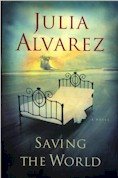Saving the World
 Saving the World is Julia Alvarez’s attempt to answer (or at least ask) the question “is it possible to do good in the world without anyone getting hurt.”
Saving the World is Julia Alvarez’s attempt to answer (or at least ask) the question “is it possible to do good in the world without anyone getting hurt.”The book has two parallel stories. The first is about Alma, a Dominican author who's in a funk, her next novel years overdue. Her husband works for an NGO and wants her help starting a green center in the Dominican Republic, a world-saving project that turns out to be not as straightforward as advertised. Alma begs off joining him, using her writing and her dying neighbor Helen as an excuse, then spends the next weeks second-guessing her decision and wallowing in loneliness. Richard winds up a hostage, held prisoner with the local AIDS clinic’s staff and patients by a group of young men who want nothing more than “the chance to be a human being.”
This half of the book is overwrought and unconvincing. I never felt as sorry for the hostage-takers as the author hopes, and Helen’s crazy son and his even crazier wife who call themselves "ethical terrorists" (and again, we’re supposed to sympathize) made no sense whatsoever. Also, Alma has a devoted husband, good friends and a successful career, so her depression, self-doubt and petty jealousy seem inexplicable. However, she does gather some redeeming strength and courage from the much more interesting story she’s been researching: the real-life story of Isabel, a Spanish rectoress who, in 1803, took 23 orphan boys on a ship bound for the American colonies to save the world from smallpox. The boys are human vaccine carriers; two at a time are vaccinated with cowpox and then, when the vesicles fill with fluid, it’s harvested to vaccinate others. The mission is fraught with hardship and often stumbles over its director’s ego, but Isabel proves herself a genuine hero.
The story is pretty amazing. Unfortunately Alvarez makes the mistake of telling it in first person, and the voice does not sound even remotely authentic. She peppers Isabel’s journal with archaic terms (“I’ll be there presently” and “it would not be a short journey hither and yon” and “we assembled our equipages”) which don’t sound at all like something Isabel Sendales y Gómez from 19th-century Spain would have said. I mean...barf. Great story, awful narrative voice.
And that’s the problem with this author: she picks great stories to tell, but her success in telling them is never a sure thing. (In the Name of Salome is another example of a good story that falls short in the telling.) This novel has its moments—I will say that she writes grief well, and the book is sprinkled with really poetic turns of phrase and even some thought-provoking ideas. But overall, I can't recommend it. The stories would have been better off in more capable hands.
I do recommend In the Time of the Butterflies. Also, Before We Were Free is a good youth-fiction novel (see Danielle's Top 10).



1 Comments:
way to go writing about something you didn't like, no body else does that. i could, cuz there's books i read occasionally that i don't like but, most of the time i do...basically i only pick good ones :D
love ya chica
Post a Comment
<< Home